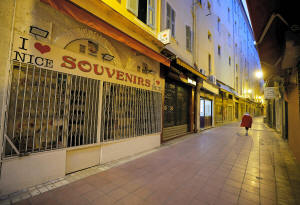Analysis: Locked-down Europe - cash to spend, nowhere to spend it
 Send a link to a friend
Send a link to a friend
 [March 24, 2021]
By Michael Nienaber and Leigh Thomas [March 24, 2021]
By Michael Nienaber and Leigh Thomas
BERLIN/PARIS (Reuters) - Only a few weeks
ago, many European countries were hoping their more affluent citizens
would by now have started spending nest eggs built up during the
pandemic to trigger a consumer-led recovery in the region's economy.
But with the spread of COVID-19 prompting new lockdowns across the
continent and vaccine campaigns behind schedule, it is still unclear
when - or indeed if - record levels of private savings will finally
convert into a much-needed spending boom.
Daniel Krupka, managing director of a technology think tank based in
Berlin, is a case in point. After Germany on Monday extended its
lockdown, he cancelled a one-week family holiday on the Baltic Sea
island of Hiddensee booked for April.
"We probably would have spent up to 2,000 euros, but this won't happen
now," Krupka said.
"Maybe we can spend a week on Hiddensee later in the year, but I'm also
thinking about using the money now for bringing down our mortgage with
an extra repayment to the bank."

While the pandemic has either threatened or destroyed the livelihoods of
millions, those lucky enough to have kept working have in many cases
bolstered their savings accounts as national restrictions deprive them
of opportunities to spend their cash.
In Germany, savings as a proportion of disposable incomes rose to a
record 16.2% last year compared to 10.9% in 2019. In France, that rate
stood at 22.2% in the fourth quarter of last year, second only to a
record 27.5% in the second quarter. Savings in Italy and Spain have also
risen strongly.
Forecasters and policymakers had hoped this reserve of enforced savings
would start to be unleashed on the euro zone economy from about now,
kickstarting a local recovery that is already expected to lag well
behind that of the United States.
LOST CONSUMPTION
But new restrictions such as those in Germany and France, the euro
zone's two largest economies, cloud such hopes.
The French Finance Ministry believes new month-long measures announced
last week targeting non-essential retail in Paris and parts of the north
will have minimal impact on the economy.
But private sector economists are less optimistic, with credit insurer
Euler Hermes trimming its 2021 growth forecast by half a percentage
point to 5.4%.
"If the latest health measures don't exceed the 4 weeks currently
planned, we can expect a big catch-up effect in the second quarter which
would help offset the impact of the new lockdowns," Euler Hermes France
economist Selin Ozyurt said.
"That depends on the return of French household confidence, the
vaccination campaign's success and the extension of state (economic)
support," she added.
The same holds true in Germany, where the Bundesbank in December
predicted the economy would grow 3% this year based on the assumption
that containment measures would be loosened in spring as more and more
people received a vaccine.
[to top of second column]
|

A woman walks in an empty street of the old town in Nice as
France's 16 hardest-hit departments will go into a third lockdown
imposed to slow the rate of the coronavirus disease (COVID-19)
contagion, in Nice, France March 19, 2021. REUTERS/ Eric
Gaillard/File Photo

"The pandemic and the lockdown measures to contain it will initially
weigh more heavily on the German economy and then probably also a
bit longer than we expected," its chief economist Jens Ulbrich told
Reuters this week.
While Ulbrich maintained the consumption backlog would still flood
back into the economy once restrictions are wound down, others said
there were plausible reasons why spending would not kick in quite as
fully as hoped.
"Certain purchases can't be repeated again and again. Anyone who
during the first lockdown bought a new large TV for a home cinema or
a high-tech kitchen to cook nice meals at home will not do this
again just after six months," said Rolf Buerkl of the GfK institute,
which conducts monthly consumer surveys.
"The same applies to certain services. You certainly don't go to the
hairdresser more often to make up for all cuts you missed during
lockdown. So certain consumer spending is simply lost in the long
run, there won't be any catch-up effects."
A Barclays Economics Research note this week was equally reserved.
It cited the lost consumption effect referred to by Buerkl; the fact
that excess savings were held by high-income earners; and the "wild
card" unknown of how the pandemic will transform consumer behaviour
in the long run.
"This underpins our cautious outlook for private consumption, which
we do not see returning to pre-crisis levels before the end of
2022," it concluded.
The burning question now is how long the restrictions will last,
which in turn depends on how fast Europe's authorities can get the
virus under control by vaccination and other measures.
European Central Bank chief economist Philip Lane said on Tuesday an
expectation that lockdown measures could persist into the second
quarter was already factored into the bank's forecast of 4% growth
in the euro zone this year.

He told CNBC that current European Union plans held out the prospect
of a substantial increase in vaccinations that in turn would start
to control the virus and so allow a progressive opening up of the
euro zone economy.
"As we now go into the second quarter, itís going to be a long
quarter," he said of the challenge ahead for Europe and its economy.
(Writing and additional reporting by Mark John; Balazs Koranyi in
Frankfurt; Giselda Vagnoni in Rome; Jesus Aguado in Madrid. Editing
by Mark Potter)
[© 2021 Thomson Reuters. All rights
reserved.] Copyright 2021 Reuters. All rights reserved. This material may not be published,
broadcast, rewritten or redistributed.
Thompson Reuters is solely responsible for this content. |